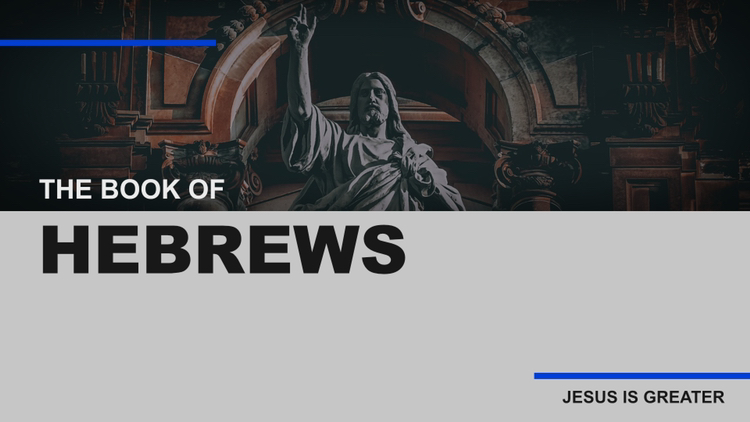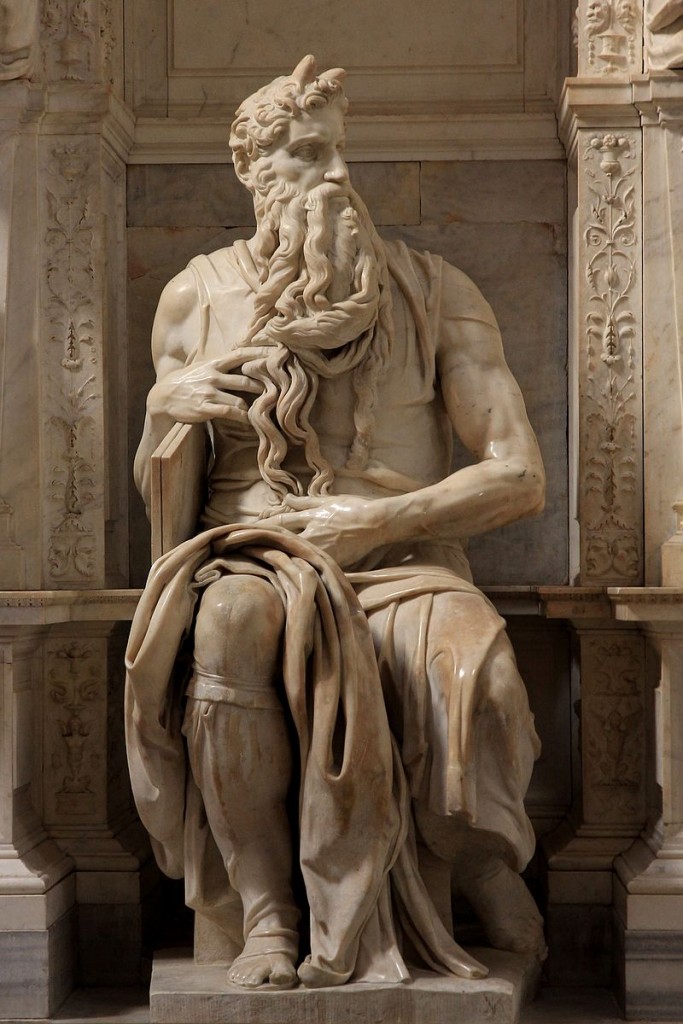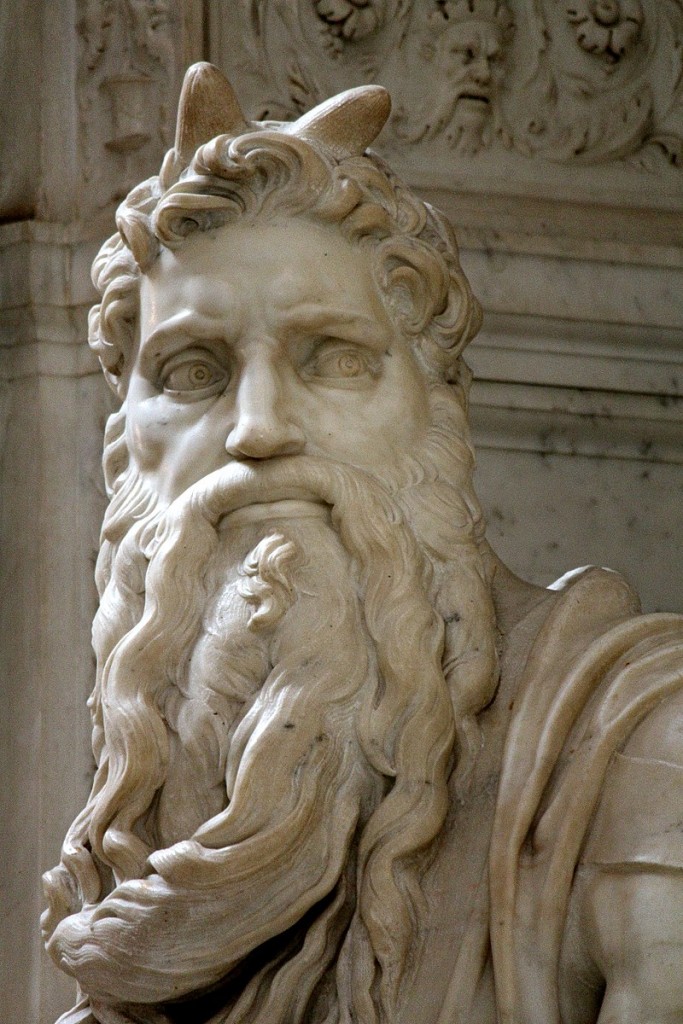
Hebrews 3:1-6
1 Therefore, holy brothers, you who share in a heavenly calling, consider Jesus, the apostle and high priest of our confession, 2 who was faithful to him who appointed him, just as Moses also was faithful in all God’s house. 3 For Jesus has been counted worthy of more glory than Moses—as much more glory as the builder of a house has more honor than the house itself. 4 (For every house is built by someone, but the builder of all things is God.) 5 Now Moses was faithful in all God’s house as a servant, to testify to the things that were to be spoken later, 6 but Christ is faithful over God’s house as a son. And we are his house, if indeed we hold fast our confidence and our boasting in our hope.
Michelangelo created his great statue of Moses from 1513-1515. It is currently housed in the church of San Pietro in Vincoli in Rome.

I have stood before this statue and marveled at its beauty. One of the most fascinating features of the statue are the horns coming out of Moses’ head.

Here is a helpful description of why Moses has these horns (and why they are frequently in artistic depictions of Moses):
Following the iconographic convention common in Latin Christianity, the statue has two horns on its head.
The depiction of a horned Moses stems from the description of Moses’ face as “cornuta” (“horned”) in the Latin Vulgate translation of the passage found at Exodus chapter 34, specifically verses 29, 30 and 35, in which Moses returns to the people after receiving the commandments for the second time. The Douay-Rheims Bible translates the Vulgate as, “And when Moses came down from the Mount Sinai, he held the two tablets of the testimony, and he knew not that his face was horned from the conversation of the Lord.” This was Jerome’s effort to faithfully translate the difficult, original Hebrew text, which uses the term קָרַן, qāran (based on the root, קֶרֶן qeren, which often means “horn”); the term is now interpreted to mean “shining” or “emitting rays” (somewhat like horns). Although some historians believe that Jerome made an outright error, Jerome himself appears to have seen qeren as a metaphor for “glorified”, based on other commentaries he wrote, including one on Ezekiel, where he wrote that Moses’ face had “become ‘glorified’, or as it says in the Hebrew, ‘horned’.” The Greek Septuagint, which Jerome also had available, translated the verse as “Moses knew not that the appearance of the skin of his face was glorified.” In general medieval theologians and scholars understood that Jerome had intended to express a glorification of Moses’ face, by his use of the Latin word for “horned.” The understanding that the original Hebrew was difficult and was not likely to mean “horns” persisted into and through the Renaissance.[1]
All of this is very interesting, and it should be noted that other theories have been put forward by way of explanation. Even so, what strikes me most about this from a layman’s and a bird’s eye view is a simple point: glory looks a little odd on human beings, does it not? There is something glorious about human beings and, as we saw earlier in Hebrews 2, human beings were made to reflect the glory of God. Even so, glory sits awkwardly on us.
I think there is a reason for this. Only God wears glory naturally. The glory of humanity in our original creation was necessarily derivative and, after the fall of man, it is now both derivative and dimmed. But the glory of Jesus is not!
Moses did indeed have a kind of glory, but it pales in comparison to the glory of Jesus. This is the point the author of Hebrews is making as we move into Hebrews 3, and he makes it in a few different ways.
Moses was faithful in the house but Jesus built the house.
In Hebrews 3 the author begins by comparing Jesus and Moses. He has previously compared Jesus and the angels. Now we get a comparison of Jesus and Moses. Let us begin by noting that Jesus and Moses are not at odds with one another. Jesus and Moses like each other very much! For instance, recall the great scene on the Mount of Transfiguration in Matthew 17.
1 And after six days Jesus took with him Peter and James, and John his brother, and led them up a high mountain by themselves. 2 And he was transfigured before them, and his face shone like the sun, and his clothes became white as light. 3 And behold, there appeared to them Moses and Elijah, talking with him.
Moses and Elijah and Jesus talking! What must that conversation have been like? Clearly Moses and Jesus and Elijah are together in reflecting the glory of God in Jesus’ transfiguration.
Or consider Jesus speaking to the two disciples in Luke 24 on the road to Emmaus.
27 And beginning with Moses and all the Prophets, he interpreted to them in all the Scriptures the things concerning himself.
Here, Jesus reveals that he saw Moses as preparing the way for Him and as playing a significant role in God’s great plan of salvation! The same idea is present among the disciples in John 1, by the way. Listen:
45 Philip found Nathanael and said to him, “We have found him of whom Moses in the Law and also the prophets wrote, Jesus of Nazareth, the son of Joseph.”
So, no, Moses and Jesus are not at odds with one another, but their ministries did differ to an extent in their focus. Consider this statement from John 1:
17 For the law was given through Moses; grace and truth came through Jesus Christ.
Well that is certainly a concise summary of their distinctive ministries. Moses gives the law, and the law has its place. Jesus brings grace and truth and fulfills the demands of the law.
The problem in the first century arose from the fact that many of the Jewish authorities had become calcified in the law. They did not see the law as preparatory or anticipatory. They saw it as the end of the matter, as all that did matter. They saw Moses as fundamentally at odds with Jesus and saw Jesus as having violated the Mosaic law and work. You can see this in the way the religious authorities questioned the man born blind in John 9, for instance.
26 They said to him, “What did he do to you? How did he open your eyes?” 27 He answered them, “I have told you already, and you would not listen. Why do you want to hear it again? Do you also want to become his disciples?” 28 And they reviled him, saying, “You are his disciple, but we are disciples of Moses. 29 We know that God has spoken to Moses, but as for this man, we do not know where he comes from.”
Another telling statement by the authorities is made in Acts 6 where we find the religious authorities stirring up some men to take hold of the early Christian Stephen. Note what they said in order to instigate these men to action.
11 Then they secretly instigated men who said, “We have heard him speak blasphemous words against Moses and God.”
Do you see? To these men, Jesus was standing “against Moses and God.”
The author of Hebrews strongly disagrees with this. He does not see Jesus as being at odds with Moses but he does see Jesus as being superior to Moses. This is why he begins the third chapter like this:
1 Therefore, holy brothers, you who share in a heavenly calling, consider Jesus, the apostle and high priest of our confession, 2 who was faithful to him who appointed him, just as Moses also was faithful in all God’s house.
Let us first ask what “God’s house” means in this context. Moses, we are told, “was faithful in all God’s house.” “In all God’s house,” Donald Guthrie states, “seems to be a figurative expression for all the responsibilities committed to him for the theocratic community.”[2] I am in agreement. It refers to all that Moses was called to do with and among the people of God. Moses was a steward of the house of God in his day and he was faithful in it.
But notice what the writer of Hebrews goes on to say:
3 For Jesus has been counted worthy of more glory than Moses—as much more glory as the builder of a house has more honor than the house itself. 4 (For every house is built by someone, but the builder of all things is God.)
This is just awesome! The writer of Hebrews does not disparage Moses. He does not insult Moses. Rather, he says that most “was faithful in all God’s house.” But then he says (paraphrasing): “But Jesus built the house!” Jesus is “worthy of more glory than Moses” in the same way that “the builder of a house has more honor than the house itself.”
Moses took care of the house, but Jesus built the house!
Moses led the children through the Red Sea, but Jesus created the sea!
Moses struck the rock and water came forth, but Jesus made the rock and the water!
The most glorious child of God on earth does not get as much glory as King Jesus!
Moses was a servant but Jesus is the Son.
And it is not just a differentiation of authority. It is also a differentiation of position. Listen again:
5 Now Moses was faithful in all God’s house as a servant, to testify to the things that were to be spoken later, 6a but Christ is faithful over God’s house as a son.
Moses was a great servant! He was one of the best! But Jesus is the Son!
Notice too the prepositions. Back in verse 2 we are told that Moses was “in” God’s house. But here in verse 6 we are told that Christ is “over” God’s house.
The servant, no matter how great he is, does not get the seat of the Son.
Here was the mistake of the Jewish authorities. Here too might have been the temptation of those to whom Hebrews was written. Moses was great, but Moses was not the Son of God.
In Revelation 15 we see that Moses’ legacy of being the deliverer of the law and the steward of the house of God in his day is secure.
2 And I saw what appeared to be a sea of glass mingled with fire—and also those who had conquered the beast and its image and the number of its name, standing beside the sea of glass with harps of God in their hands. 3 And they sing the song of Moses, the servant of God, and the song of the Lamb, saying,
“Great and amazing are your deeds, O Lord God the Almighty! Just and true are your ways, O King of the nations!
But even here we recall that Moses is never given worship in Heaven. But Jesus is!
Moses was worthy of our attention. Jesus is worthy of our worship.
Moses gets his measured applause. Jesus gets His eternal praise.
Time and time and time again the failure to recognize that the servant is beneath the Son has wounded and hurt the church.
Over the last couple of weeks yet another documentary has come out exposing the hypocrisy and shame of yet another mega-church that gave in to a lust for celebrity and power. Last year many of us listened to a now infamous podcast detailing another fall from grace by yet another celebrity pastor.
How much damage has been wrought in the house of God because God’s servants want the worship that belongs only to the Son.
To be frank, seen from another perspective there is something ironic about Michelangelo’s Moses having horns instead of rays. If I may be allowed some license that goes against, certainly, Michelangelo’s intent, I would simply say this for our context: there is a short step between rays of glory and horns of shame and when human beings want glory they frequently end up with horns.
Beware the desire to want to be more than a servant! Beware the desire to have the glory due only the Son!
Let us never forget: we are in the house of God as servant but Jesus is over the house of God as the Son!
Moses led God’s people but Jesus is forming God’s people.
And then we have the final words of our section. It is a further statement on the nature of “the house of God.”
6b-c And we are his house, if indeed we hold fast our confidence and our boasting in our hope.
This is most profound! “We are his house!” The people of God are the house of God! The house of God is a people.
We find this idea in 1 Corinthians 3 where Paul wrote:
9 For we are God’s fellow workers. You are God’s field, God’s building.
We find the metaphor again in 1 Peter 2 where Peter said:
5 you yourselves like living stones are being built up as a spiritual house, to be a holy priesthood, to offer spiritual sacrifices acceptable to God through Jesus Christ.
This qualification of the definition of “house of God” is important. It points to yet another way that Jesus is superior to Moses. For if the house of God is the people of God this means that while Moses was privileged to lead the people from within Jesus is exalted to form the people from above!
In Matthew 16:18 Jesus said “I will build my church, and the gates of hell shall not prevail against it.”
Jesus is building us! Jesus is forming us!
Moses led for a while, but Jesus and only Jesus can shape us and mold us and transform us!
In Romans 8 Paul offers his beautiful and transformative words of hope:
29 For those whom he foreknew he also predestined to be conformed to the image of his Son, in order that he might be the firstborn among many brothers.
We were “predestined to be conformed to the image of his Son.”
The Son is building and forming us to look like the Son!
We are being made and changed into the image of Jesus Himself!
Moses could not do this.
No preacher can do this.
No guru or philosopher or favorite teacher or leader can do this!
No steward can be the Savior.
No servant can be the Son.
This is the work of the Son. He alone is worthy and able to do it! He alone is all powerful and majestic and glorious!
We thank the Lord for Moses and his work…but we worship Jesus and throw ourselves, along with Moses, at Jesus’ feet!
The Son is more.
The Son is greater.
Praise and worship the Son!
[1] https://en.wikipedia.org/wiki/Jerome
[2] Guthrie, Donald. Hebrews (Tyndale New Testament Commentaries). InterVarsity Press. Kindle Edition.

Oh, my, my, my goodness…….. me was all excited that Wymanus had discovered the spiritual gift of bluntness (if you please)……… “To be frank” and alas, my Oratio, Meditatio, Tentatio was all in a real tidy nice package and then this message just shreds my little current theological scaffolding into confetti, confectum, confectus and is now just blowing around the outside in the streets and is now being carried off by the winds of change……. breath-taking realities, stunned silence and alas, Amen! What a message, what a Savior!!!!!!!! Hallelujah Thanks ol buddy
Nothing like having the “wax paper” thin window of my conscience ripped away and
the light comes in like a flood and blinds………..oh, Glory, oh……. painful…… Ps. 39:12, 13……… “remove your gaze from……before I go away and am no more”
Congrats on Volume 5 for JLG, Jr Thank YOU Dr. Richardson…… voilà
Thanks so much brother!